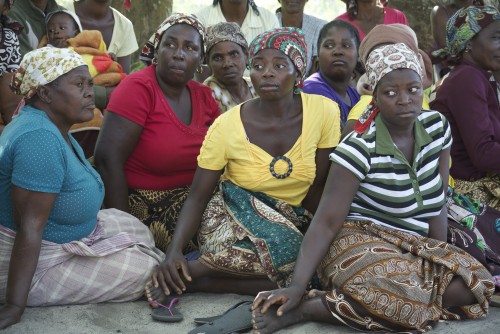I have spent my summer interning with the International Union for Conservation of Nature (IUCN) in the Global Gender Office (GGO) in Washington D.C. What an experience it has been!
IUCN is an intergovernmental agency working to find “pragmatic solutions to our most pressing environmental and development challenges.” And gender equality and equity, as a fundamental human right, is a pre-condition for the achievement of IUCN’s mission for sustainable development.
The GGO, since its approval in 1998, has worked to incorporate women and gender considerations into policy at the regional and national levels in all aspects of the environmental sector. This includes efforts to mainstream gender equality among global forums, secretariats, and international governments through the development of sector-specific tools. One such tool, the Environment and Gender Index (EGI), I was hired to work on.
For the first time, governments have equipped all three of the Rio Conventions with strong mandates on gender equality and women’s empowerment. By signing and ratifying the Conventions on biological diversity (UNCBD), climate change (UNFCCC), and desertification (UNCCD), governments have officially committed to implement these agreements, and monitor and report on their progress.
The EGI will make tremendous headway in exposing the inequalities that exist for women in over 80 countries using concrete indicators in areas such as climate change, resource allocation, land tenure, energy access, transportation, water, agriculture, leadership, health and other environment-related sectors. Women make up 80% of the agricultural workers, however, only about 1% of them own their own land. Women often have tremendous knowledge and experience adapting to climate change, but they do not sit at the decision-making tables with power to make changes. And women throughout Africa, Asia, and Latin America are poised to lead in small-scale energy entrepreneurship, but the world’s financing mechanisms have not reached them yet.
The EGI is the first effort to comprehensively monitor country progress toward gender equality and women’s empowerment in the global environmental governance arena by informing governments, multinational corporations, and stakeholders of the continuing gender gap around the world. The EGI aims to promote greater transparency and accountability, and to contribute to the full, effective, and sustained implementation of the Conventions. With the EGI in place, policymakers and others will understand the nature of these inequalities and be better positioned to take action on women’s rights and their empowerment.
My role in the EGI has been in a couple different directions. I have analyzed qualitative data by the FAO on land tenure rights for women in the countries in our index; investigated climate funding for the inclusion of gender by institutions such as the Clean Development Mechanism (CDM), Green Climate Fund (GCF), Global Environment Facility, and the Adaptation Fund; and developed data and analyzed the participation of female delegates at the UN Convention COPs.
The GGO is launching our EGI at the inaugural “Gender Day” event at this year’s global climate change conference in Warsaw (COP19). Stay tuned…we are anticipating some very exciting speakers for our launch!
Soon after beginning my internship, I was asked to increase my time at IUCN and work with the Global Senior Gender Advisor developing a national strategy for climate change and gender in Mozambique.
Since beginning in 2010, the GGO has spearheaded the development of national gender-responsive climate change strategies (ccGAPs) in 12 countries and regions: Mozambique, Costa Rica, Haiti, Panama, Jordan, Egypt, Bangladesh, Liberia, Tanzania, Nepal, Central America, and the Arab League. Yes, Mozambique is already on that list, but the government, particularly the Ministry for the Cooperation of Environmental Affairs (MICOA) has requested an elaboration of the material because the initial strategy was completed in 2010. Now, with many more lessons learned from other countries developing Plans of Action, we are revisiting the Mozambique strategy.
Our work is focused on analyzing the current situation of gender in Mozambique’s climate change policy. It has been interesting to match what skills I learned in the Climate Policy program at Bard CEP and put them to real use as I learn even more about the intricacies of funding, communicating with stakeholders, multilateral institutions, and the bureaucracy of it all. It is very important to our GGO team that in this process the ccGAP is anchored to existing national climate change policy and process for adaptation and mitigation. This is critical to ensure national ownership of the strategy, but we also want to make sure this is not limited to government involvement. So we work to build the capacity of local actors who are entrenched in the local context and are responding to local needs, while continuing to address internal institutional arrangements, and thereby (hopefully) securing successful implementation. Basically I spend a lot of time Skyping with Africa but also have spent an incredible amount of time researching the political and environmental history of Mozambique. And after weeks of research I now know everything there is to know about the environmental and climate policy in Mozambique and am fully prepared (or mostly?).
So far, this internship has been a whirlwind of activity (and excessive, swampy humidity). Especially because of my location in DC, I feel that I have gained an incredible experience in the sustainable development and environmental policy arena with added bonuses of meetings at WRI, discussions at USAID with Nobel Peace Prize recipient Muhammad Yunus, and hearing DevelopmentXChange innovators and National Security Advisor Susan Rice speak. It all seems somewhat surreal, especially my departure for Mozambique next week. I could not be more excited/nervous but looking forward to the opportunity to use my Bard CEP-acquired skills and knowledge to make the most out of the trainings, workshops, interactions, and reporting on the national gender and climate change strategy.
As a true nature lover, sometimes I get away from the hubbub of the city and find what fine offerings nature has as seen here in this video in Shenandoah National Park in VA.


Nice form, Margaux!